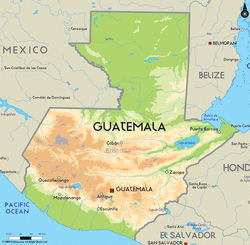
Why Guatemala?
As our name suggests, all of our support is focused on helping children and families in Guatemala, a country of stark contrasts. It's natural beauty and strong indigenous culture stand in contrast to the widespread poverty suffered by much of its population, especially those living in rural communities. According to the World Bank, approximately 75 percent of the population is estimated to live below the poverty line. And, according to the United Nations World Food Program, Guatemala has the fourth highest rate of chronic malnutrition in the world, with an estimated 49 percent of the children suffering from chronic malnutrition.
Many Guatemalan families struggle to provide the basic necessities for their families, and cannot afford the expenses associated with school. The country struggles with high illiteracy rates, access to quality health care and housing. In addition to extreme poverty, Guatemala struggles with the after effects of a bloody 36-year civil war, which ended in 1996, as well as persistent political corruption, unemployment, and a marked disparity in income distribution, with indigenous Mayans, the majority of the population, the most impoverished.
As our name suggests, all of our support is focused on helping children and families in Guatemala, a country of stark contrasts. It's natural beauty and strong indigenous culture stand in contrast to the widespread poverty suffered by much of its population, especially those living in rural communities. According to the World Bank, approximately 75 percent of the population is estimated to live below the poverty line. And, according to the United Nations World Food Program, Guatemala has the fourth highest rate of chronic malnutrition in the world, with an estimated 49 percent of the children suffering from chronic malnutrition.
Many Guatemalan families struggle to provide the basic necessities for their families, and cannot afford the expenses associated with school. The country struggles with high illiteracy rates, access to quality health care and housing. In addition to extreme poverty, Guatemala struggles with the after effects of a bloody 36-year civil war, which ended in 1996, as well as persistent political corruption, unemployment, and a marked disparity in income distribution, with indigenous Mayans, the majority of the population, the most impoverished.
Why Donate through the Guatemala Aid Fund?
If you are like us at the 100% Volunteer GAF Organization, we feel that we have been blessed with a life that includes a home, access to school, clean water and opportunities for work and a self supporting future. We have seen firsthand in Guatemala that most if not all of these things are out of reach for much of the indigenous and general population in Guatemala. Being the 4th poorest country in the world, with severe malnutrition of greater than 50 percent of the indigenous children and minimal opportunities for education and employment, Guatemalans are fleeing their country. Most do NOT want to leave their families, and the land they love, but they do not have free high school, or meal support or food stamps, and many cannot provide adequatly for themselves or their families. They want an education, they want jobs, they want to stay. We at GAF have chosen to support the Fatima Children's Home child protection, education, and family support and outreach programs. They have included an expansion project that includes the development of not only a children's home for abused and abandoned children until they can be reunified with family or adopted, they are committed to supporting long term education for children in their care, and in rural schools. They invest in not only the childs basic needs, but also include psychological and medical support, extended family support and parental training courses. The Solola Home school project includes plans for an organic farm, eco-cabins for sustainable income sources, as well as a plan to purchase and preserve land including two indigenous religous ceremonial sites, and native wildlife and forest habitat. We look at your donations as investments in futures for Guatemalans, as well as protection of their land, culture and people. Just like a scholarship you are passing your great fortune on to others that need funding to help secure a future in their own country. See the multi-phase project and existing successful programs on our webpage www.guatemalaaidfund.org
Thank you for considering these Guatemalan Run programs for your Charitable Giving!
Thank you for considering these Guatemalan Run programs for your Charitable Giving!
